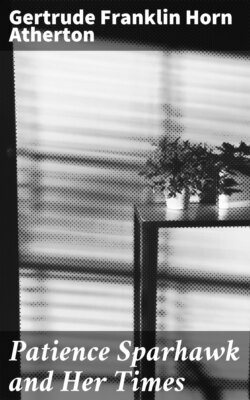Читать книгу Patience Sparhawk and Her Times - Gertrude Franklin Horn Atherton - Страница 20
На сайте Литреса книга снята с продажи.
XV
ОглавлениеTable of Contents
At midnight Patience was awakened by a frantic clamour in the street. “Those dreadful Bohemians,” she thought sleepily, then sat up with thumping heart.
“They say your name, niña, no?” said Lola, whose sonorous slumbers had also been disturbed.
Patience slipped to the floor and looked through the window. The moon flooded the old town. The ruined fort on the hill had never looked more picturesque, the pines above more calm. In the hollow near the blue waters the white arms of Junipero Serra’s cross seemed extended in benediction. The old adobes were young for the hour. One might fancy Isabel Herrara walking down from the long house on the hill, her reboso fluttering in the night wind, old Pio Pico, glittering with jewels, beside her.
And in the wide street before the Custom House, surrounded by a hooting mob, the refuse of the saloons, was a cursing gesticulating woman. Her black hair was unbound, her garment torn. She flung her fists in the face of those that sought to hold her.
“Patience Sparhawk!” she shrieked. “Patience Sparhawk! Come down here to your mother. Come down here this minute. Come, I say,” and a volley of oaths followed, greeted with a loud cackling laugh by the rabble.
Patience saw Mr. Foord, clad in his dressing-gown, go forth. She flung on her clothes hastily and ran down the stair. Her mother and Mr. Foord were in the kitchen.
“Oh, she’ll come back,” Mrs. Sparhawk was saying. “I’ll see to that. How do you like a row under your windows? Well, I’ll come here every night unless she comes home. You’ll put me in the Home of the Inebriates, will you? Think she’ll like to have that said of her mother when she’s grown up? Not Patience Sparhawk. I know her weak point. She’s as proud as hell, and I’m not afraid of going to any Home of the Inebriates.”
Patience pushed open the door. “I’m going with you,” she said. “Now get out of this house as fast as you can.”
“Oh, Patience,” exclaimed Mr. Foord. His old cheeks were splashed with tears.
“Oh, I’m so sorry. I’m so sorry,” said Patience, her hands clenching and quivering. “I didn’t think she’d do this, or I wouldn’t have stayed. What a return for all your kindness!”
“Patience,” said the old gentleman, “promise me that you will come to see me to-morrow. Promise, or I shall not let you go. She can do her worst.”
“Well, I’ll come.”
She ordered her mother to follow her out of the back door that they might avoid the expectant mob. Mrs. Sparhawk walked unsteadily, but received no assistance from her daughter. If she had fallen, Patience could not have forced herself to touch her. Had the woman been a reeling mass of physical corruption, a leper, a small-pox scab, the girl could not have shrunken farther from her.
They did not speak until they ascended the hill behind the town and entered the woods. Patience never recalled that night without inhaling the balsamic odour of the pines, the heavy perfume of forest lilies, without seeing the great yellow stars through the uplifted arms of the trees. It was a night for love, and its guest was hate.
No more terrible conversation ever took place between mother and daughter. After that night they never spoke again.
